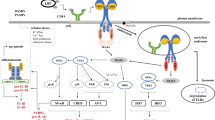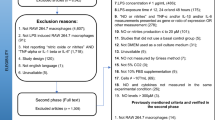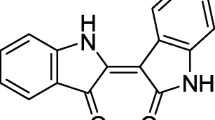Abstract
In this study, we treated HCT-116 cells with Clostridium butyricum (C. butyricum) supernatant and observed its effects on the TLR2/MyD88/NF-κB signaling pathway and RORγt, to further explore the possible immune regulatory mechanism of C. butyricum. Our results showed that C. butyricum supernatant downregulated the mRNA and protein levels of TLR2, MyD88, NF-κBp65, and RORγt in HCT-116 cells and the protein levels of phospho-NF-κBp65. Partial blockage of TLR2 by CD282 weakened the inhibitory effects of C. butyricum supernatant on the above pathway components. Those component levels were still inhibited by C. butyricum supernatant after Pam3CSK4 activation of TLR2. In summary, C. butyricum supernatant can inhibit the TLR2/MyD88/NF-κB signaling pathway and the expression of RORγt in HCT-116 cells. These effects are at least partly achieved through inhibition of TLR2.




Similar content being viewed by others
References
Rembacken BJ, Snelling AM, Hawkey PM, Chalmers DM, Axon AT (1999) Non-pathogenic Escherichia coli versus mesalazine for the treatment of ulcerative colitis: a randomised trial. Lancet 354:635–639. https://doi.org/10.1016/s0140-6736(98)06343-0
Kruis W, Fric P, Pokrotnieks J, Lukás M, Fixa B, Kascák M, Kamm MA, Weismueller J, Beglinger C, Stolte M, Wolff C, Schulze J (2004) Maintaining remission of ulcerative colitis with the probiotic Escherichiacoli Nissle 1917 is as effective as with standard mesalazine. Gut 53:1617–1623. https://doi.org/10.1136/gut.2003.037747
Tursi A, Brandimarte G, Papa A, Giglio A, Elisei W, Giorgetti GM, Forti G, Morini S, Hassan C, Pistoia MA, Modeo ME, Rodino’ S, D’Amico T, Sebkova L, Sacca’ N, Di Giulio E, Luzza F, Imeneo M, Larussa T, Di Rosa S, Annese V, Danese S, Gasbarrini A (2010) Treatment of relapsing mild-to-moderate ulcerative colitis with the probiotic VSL#3 as adjunctive to a standard pharmaceutical treatment: a double-blind, randomized, placebo-controlled study. Am J Gastroenterol 105:2218–2227. https://doi.org/10.1038/ajg.2010.218
Wildt S, Nordgaard I, Hansen U, Brockmann E, Rumessen JJ (2011) A randomised double-blind placebo-controlled trial with Lactobacillusacidophilus La-5 and Bifidobacteriumanimalis subsp. lactis BB-12 for maintenance of remission in ulcerative colitis. J Crohns Colitis 5:115–121. https://doi.org/10.1016/j.crohns.2010.11.004
Yoshimatsu Y, Yamada A, Furukawa R, Sono K, Osamura A, Nakamura K, Aoki H, Tsuda Y, Hosoe N, Takada N, Suzuki Y (2015) Effectiveness of probiotic therapy for the prevention of relapse in patients with inactive ulcerative colitis. World J Gastroenterol 21:5985–5994. https://doi.org/10.3748/wjg.v21.i19.5985
Cai M, Zeng L, Li LJ, Mo LH, Xie RD, Feng BS, Zheng PY, Liu ZG, Liu ZJ, Yang PC (2016) Specific immunotherapy ameliorates ulcerative colitis. Allergy Asthma Clin Immunol 12:37. https://doi.org/10.1186/s13223-016-0142-0
Lan B, Yang F, Lu D, Lin Z (2016) Specific immunotherapy plus Clostridiumbutyricum alleviates ulcerative colitis in patients with food allergy. Sci Rep 6:25587. https://doi.org/10.1038/srep25587
Fukuda S, Toh H, Hase K, Oshima K, Nakanishi Y, Yoshimura K, Tobe T, Clarke JM, Topping DL, Suzuki T, Taylor TD, Itoh K, Kikuchi J, Morita H, Hattori M, Ohno H (2011) Bifidobacteria can protect from enteropathogenic infection through production of acetate. Nature 469:543–547. https://doi.org/10.1038/nature09646
Okamoto T, Sasaki M, Tsujikawa T, Fujiyama Y, Bamba T, Kusunoki M (2000) Preventive efficacy of butyrate enemas and oral administration of Clostridiumbutyricum M588 in dextran sodium sulfate-induced colitis in rats. J Gastroenterol 35:341–346. https://doi.org/10.1007/s005350050358
Cruz-Guerrero A, Hernández-Sánchez H, Rodríguez-Serrano G, Gómez-Ruiz L, García-Garibay M, Figueroa-González I (2014) Commercial probiotic bacteria and prebiotic carbohydrates: a fundamental study on prebiotics uptake, antimicrobials production and inhibition of pathogens. J Sci Food Agric 94:2246–2252. https://doi.org/10.1002/jsfa.6549
Xie Y, Zhou LY, Yao XJ, Li Y (2020) Protective effects of clostridium butyricum in a murine model of dextran sodium sulfate-induced colitis that involve inhibition of the TLR2 signaling pathway and T helper 17 cells. Am J Med Sci 360:176–191. https://doi.org/10.1016/j.amjms.2020.05.021
Zhao L, Kwon MJ, Huang S, Lee JY, Fukase K, Inohara N, Hwang DH (2007) Differential modulation of Nods signaling pathways by fatty acids in human colonic epithelial HCT116 cells. J Biol Chem 282:11618–11628. https://doi.org/10.1074/jbc.M608644200
Ahmed Nasef N, Mehta S, Powell P, Marlow G, Wileman T, Ferguson LR (2015) Extracts of feijoa inhibit toll-like receptor 2 signaling and activate autophagy implicating a role in dietary control of IBD. PLoS ONE 10:e0130910. https://doi.org/10.1371/journal.pone.0130910
Cao Q, Gao X, Lin Y, Yue C, Wang Y, Quan F, Zhang Z, Liu X, Lu Y, Zhan Y, Yang H, Li X, Qin D, Birnbaumer L, Hao K, Yang Y (2019) Thymopentin ameliorates dextran sulfate sodium-induced colitis by triggering the production of IL-22 in both innate and adaptive lymphocytes. Theranostics 9:7490–7505. https://doi.org/10.7150/thno.35015
Meng S, Li Y, Zang X, Jiang Z, Ning H, Li J (2020) Effect of TLR2 on the proliferation of inflammation-related colorectal cancer and sporadic colorectal cancer. Cancer Cell Int 20:95. https://doi.org/10.1186/s12935-020-01184-0
Park GB, Jeong JY, Kim D (2020) Modified TLR-mediated downregulation of miR-125b-5p enhances CD248 (endosialin)-induced metastasis and drug resistance in colorectal cancer cells. Mol Carcinog 59:154–167. https://doi.org/10.1002/mc.23137
Sui SJ, Tian ZB, Wang QC, Chen R, Nie J, Li JS, Wei LZ (2018) Clostridium butyricum promotes intestinal motility by regulation of TLR2 in interstitial cells of Cajal. Eur Rev Med Pharmacol Sci 22:4730–4738. https://doi.org/10.26355/eurrev_201807_15533
Sloane JA, Batt C, Ma Y, Harris ZM, Trapp B, Vartanian T (2010) Hyaluronan blocks oligodendrocyte progenitor maturation and remyelination through TLR2. Proc Natl Acad Sci USA 107:11555–11560. https://doi.org/10.1073/pnas.1006496107
St Paul M, Barjesteh N, Paolucci S, Pei Y, Sharif S (2012) Toll-like receptor ligands induce the expression of interferon-gamma and interleukin-17 in chicken CD4+ T cells. BMC Res Notes 5:616. https://doi.org/10.1186/1756-0500-5-616
Williams NT (2010) Probiotics. Am J Health Syst Pharm 67:449–458. https://doi.org/10.2146/ajhp090168
Ng SC, Hart AL, Kamm MA, Stagg AJ, Knight SC (2009) Mechanisms of action of probiotics: recent advances. Inflamm Bowel Dis 15:300–310. https://doi.org/10.1002/ibd.20602
Davis JE, Braucher DR, Walker-Daniels J, Spurlock ME (2011) Absence of Tlr2 protects against high-fat diet-induced inflammation and results in greater insulin-stimulated glucose transport in cultured adipocytes. J Nutr Biochem 22:136–141. https://doi.org/10.1016/j.jnutbio.2009.12.008
Kashiwagi I, Morita R, Schichita T, Komai K, Saeki K, Matsumoto M, Takeda K, Nomura M, Hayashi A, Kanai T, Yoshimura A (2015) Smad2 and Smad3 inversely regulate TGF-β autoinduction in Clostridiumbutyricum-activated dendritic cells. Immunity 43:65–79. https://doi.org/10.1016/j.immuni.2015.06.010
Kumar A, Hecht C, Priyamvada S, Anbazhagan AN, Alakkam A, Borthakur A, Alrefai WA, Gill RK, Dudeja PK (2014) Probiotic Bifidobacterium species stimulate human SLC26A3 gene function and expression in intestinal epithelial cells. Am J Physiol Cell Physiol 307:C1084–C1092. https://doi.org/10.1152/ajpcell.00194.2014
D’Arienzo R, Maurano F, Lavermicocca P, Ricca E, Rossi M (2009) Modulation of the immune response by probiotic strains in a mouse model of gluten sensitivity. Cytokine 48:254–259. https://doi.org/10.1016/j.cyto.2009.08.003
Gao QX, Qi LL, Wu TX, Xia TT, Wang JB (2013) Immunomodulatory effects of Clostridiumbutyricum on human enterocyte-like HT-29 cells. Anim Cells Syst 17:121–126. https://doi.org/10.1080/19768354.2013.789075
Gao Q, Qi L, Wu T, Wang J (2012) Clostridium butyricum activates TLR2-mediated MyD88-independent signaling pathway in HT-29 cells. Mol Cell Biochem 361:31–37. https://doi.org/10.1007/s11010-011-1084-y
Zarrati M, Salehi E, Nourijelyani K, Mofid V, Zadeh MJ, Najafi F, Ghaflati Z, Bidad K, Chamari M, Karimi M, Shidfar F (2014) Effects of probiotic yogurt on fat distribution and gene expression of proinflammatory factors in peripheral blood mononuclear cells in overweight and obese people with or without weight-loss diet. J Am Coll Nutr 33:417–425. https://doi.org/10.1080/07315724.2013.874937
Qiu X, Zhang M, Yang X, Hong N, Yu C (2013) Faecalibacterium prausnitzii upregulates regulatory T cells and anti-inflammatory cytokines in treating TNBS-induced colitis. J Crohns Colitis 7:e558–e568. https://doi.org/10.1016/j.crohns.2013.04.002
Böcker U, Yezerskyy O, Feick P, Manigold T, Panja A, Kalina U, Herweck F, Rossol S, Singer MV (2003) Responsiveness of intestinal epithelial cell lines to lipopolysaccharide is correlated with Toll-like receptor 4 but not Toll-like receptor 2 or CD14 expression. Int J Colorectal Dis 18:25–32. https://doi.org/10.1007/s00384-002-0415-6
Shin DS, Rhee KJ, Eom YB (2020) Effect of probiotic clostridium butyricum nctc 7423 supernatant on biofilm formation and gene expression of Bacteroidesfragilis. J Microbiol Biotechnol 30:368–377. https://doi.org/10.4014/jmb.2001.01027
Shin DS, Eom YB (2020) Antimicrobial and antibiofilm activities of Clostridiumbutyricum supernatant against Acinetobacterbaumannii. Arch Microbiol 202:1059–1068. https://doi.org/10.1007/s00203-020-01823-0
Isono A, Katsuno T, Sato T et al (2007) Clostridium butyricum TO-A culture supernatant downregulates TLR4 in human colonic epithelial cells. Dig Dis Sci 52:2963–2971. https://doi.org/10.1007/s10620-006-9593-3
Acknowledgements
The authors gratefully acknowledge financial support from the Shenyang Science and Technology Bureau (CN) (Contract No. F13-316-1-24).
Author information
Authors and Affiliations
Contributions
YX wrote the manuscript, performed the immunocytochemistry and qRT-PCR, analyzed the data, and approved the final version of the manuscript. LZ cultured cells and probiotics. HL performed the western blot and analyzed the data. YL conceived the study protocol, critically revised the manuscript, obtained funding and approved its final version.
Corresponding author
Ethics declarations
Conflict of interest
The authors declare that they have no conflict of interest.
Additional information
Publisher's Note
Springer Nature remains neutral with regard to jurisdictional claims in published maps and institutional affiliations.
Supplementary Information
Below is the link to the electronic supplementary material.






Rights and permissions
About this article
Cite this article
Xie, Y., Zhou, L., Li, H. et al. Clostridium butyricum Supernatant Regulates the Expression of RORγt in HCT-116 Cells by Inhibiting the TLR2/MyD88/NF-κB Signaling Pathway. Curr Microbiol 78, 1543–1550 (2021). https://doi.org/10.1007/s00284-021-02392-1
Received:
Accepted:
Published:
Issue Date:
DOI: https://doi.org/10.1007/s00284-021-02392-1




